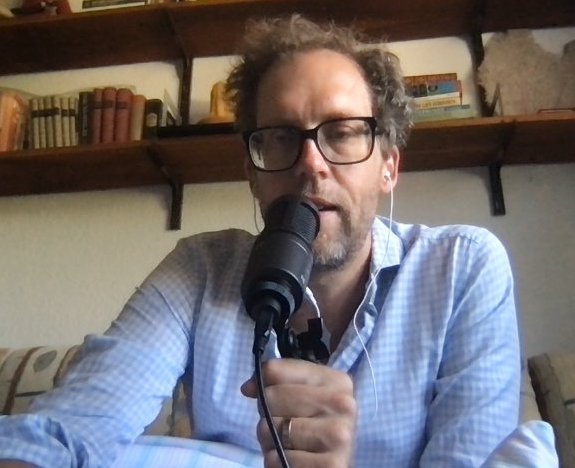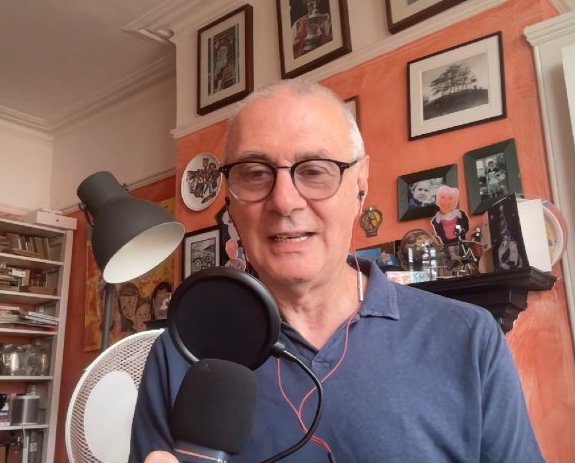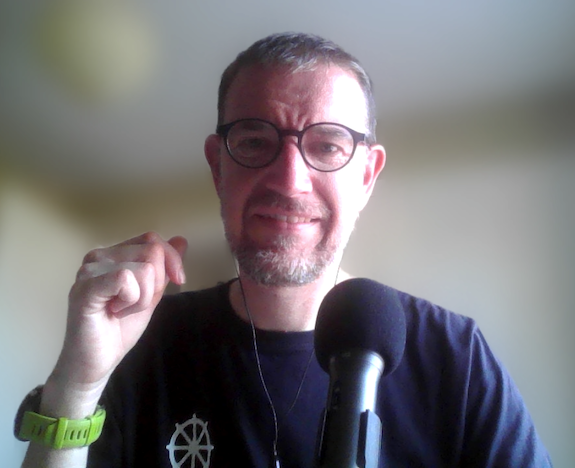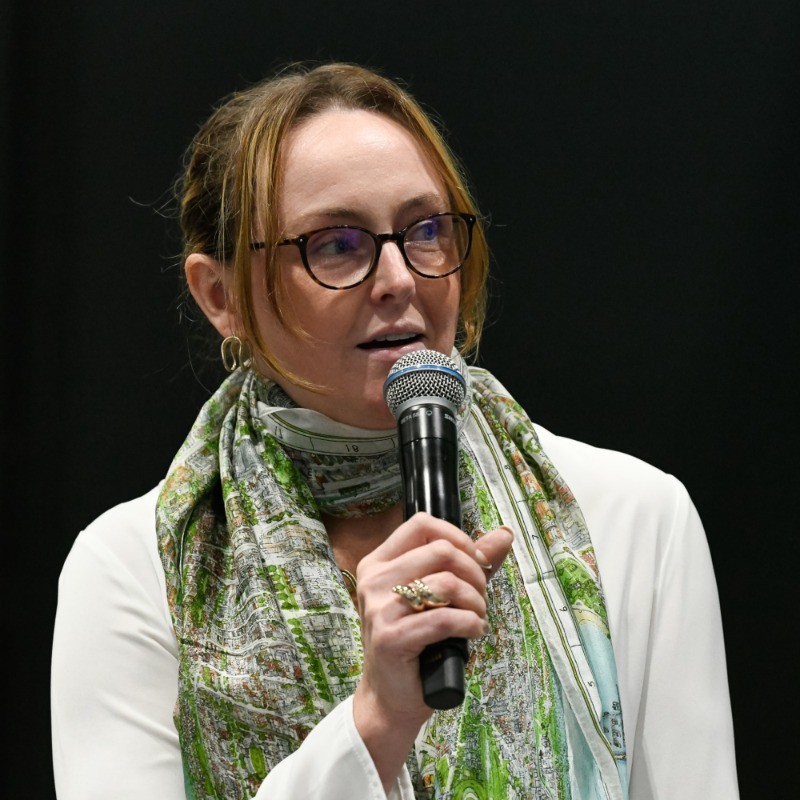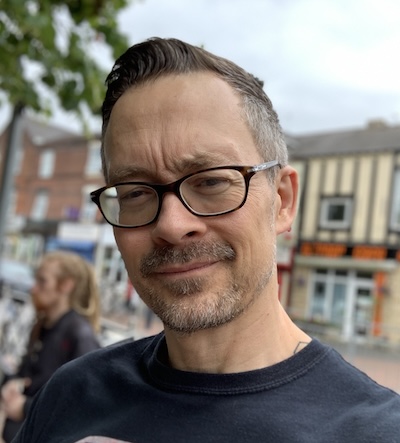Subscribe
In this episode Ed chats with Muthukumar Kumar: navigation engineer, maker of leading geo blog Geoawesomeness, and the person who got Geomob Munich (#geomobMUC) going. We discuss several things, but especially how Muthu got the Munich community going, and how that might be a model for anyone in another city that wants to get a local Geomob community going.
Relevant links:
About the podcast
On the Geomob podcast every week we discuss themes from the geo industry, interview Geomob speakers, and provide regular updates about our own projects.
Popular podcast topics:
The Geomob podcast is hosted by:
Autogenerated Transcript:
Ed 00:01 Welcome to the geomob podcast where we discuss geoinnovation in any and all forms be it for fun or profits.
Ed 00:11 Hi everyone. Ed Freyfogle here. Welcome back to another episode of the geomob podcast. Today my guest is Muthukumar Kumar who has over the last year I've been building up the Geomob Munich communities, so we're going to talk with them all about that and how he got it going. His background in geo and hopefully it's a good guide for anyone out there who wants to start them up in another city or if you just want to learn about geo and Munich, welcome. Tell us a bit about yourself.
Muthu 00:40 Hey Ed, first of all, thank you very much for having me on the podcast. It's a pleasure to be here this evening. I'm looking forward to it. I am a navigation engineer working with Deutsche Bahn as a localization expert since February this year. Before that I was working with Trimble as an engineer for the past four and a half years. I also happen to run a blog by the name of geoawesomeness, which basically covers all the geospatial topics are on location based technologies.
Ed 01:05 Sorry, you're quite humble. Muthu it cause it gets you awesome. This is is massive. I mean it is not just a blog. I mean this is what just the readership of GOs and this, I mean it's, it's huge.
Muthu 01:15 That's very kind of you. Yeah. I mean we've been at it for almost nine years now and right now we have a readership of about 200,000 page visits every month. I guess this year it's actually kind of exploded and we had more than a million page visits already so far. Yeah. But we are a community of bloggers. It's not just me. So we've had more than a hundred people log what you're asking us over the years.
Ed 01:40 Okay. So that's a project you do on the side. Tell us a little bit about your background professionally. You're working on navigation type stuff. Is that it?
Muthu 01:48 Right. Navigation type stuff. That's pretty much it. So, um, I graduated with a master's in space science and technologies around it. And yeah, I've been working as a navigation engineer that basically means I've been working with GPS or GNSS receivers. Um, the last couple of years and I recently started a new role at Deutsche Bahn, the German railways. Um, as a localization expert, you know, trying to bring you localization technologies to the general chairman railways so to speak. Yeah.
Ed 02:16 So it, this is like literally figuring out where the train is is on it.
Muthu 02:19 Yeah, in a nutshell. Yes. I mean currently this has been done with other technologies that rely on occupant from the track side. We are trying to explore new technologies that could potentially take it forward and try to locate the train in a more safe and more precise manner than what's possible today. That's more or less it.
Ed 02:38 Okay. Very cool. Very cool. I mean let's get you a lot of points on the geographic scale. I would say cause you got geo stuff, you also get the train set. It's very cool. Okay. Tell us a bit about more about -inaudible- and what goes on there and then what led you to get involved with Juma? Like to set up.
Muthu 02:56 So for us, the awesomeness show awesome was actually started way back in 2011. The original idea was, you know, a typical blog that showcased our interest in the jewelry industry and our passion for all things location-based. Um, well we started off and it was started by a good friend of mine, Alex. Um, I joined Alex in 2013 and we've been at it ever since today we've had, like I said, more than a hundred people blocked for us or block for two, Austin and us. And it's getting more and more to a stage where we see our mission as an evangelist for geospatial technology and everything awesome around it and what you could technically do with your special data and your special technologies and write it or explain these concepts in a way that's accessible to everybody. That's something that it's very, very core for us that we don't want to use a lot of charting. We don't want to focus on the content that makes it difficult for our people who are not within our walled garden, the geospatial industry. And try to make it easier for people outside the industry to understand what's going on and maybe hopefully figure out how we could, you know, make it pass the toothbrush test, so to speak.
Ed 04:09 Very cool. Congratulations on your, the longevity of the project. I mean, I see a lot of people who kind of come in with the passion and they're like, Oh, let's, let's do this cool project. The hard part is the endurance, keeping it going for a long time. That's impressive.
Muthu 04:25 That's, that's actually very, very true. That's one of the things that's even a challenge for us even today. Luckily we've been very, very fortunate to have very understanding partners who've been more than happy to let us spend a few hours every day a week, um, for the last couple of years focusing on this passion project, so to speak. But again, like I said, we've been very, very fortunate also in terms of other guest bloggers and people who have been very happy to, uh, to discuss the ideas on Jasmine. So, yep. It's been a lot of fun.
Ed 04:56 I guess it was about a year ago or so, maybe a little longer. At some point you said it's not enough. You also need to get GM up Munich going, what prompted that and what, tell us about your experiences there.
Muthu 05:07 Right. I mean, you and I have been thinking about this for quite a bit and I always felt that building an online community was not enough, or rather it was, was great, but I always felt that I had these wonderful conversations and discussions with people, uh, virtually. And I always wanted to kind of create or recreate this experience in a physical way. I wanted to bring the community in Munich together for a while, then a platform to be able to discuss and to have fun on geospatial topics. And that's when I decided to start show more Munich and I loved how you kind of created and promoted Geomob in London. I think that's too much.
Ed 05:49 Yeah, that's where we started. Yeah.
Muthu 05:52 Yeah. And then we had shown him up in Munich and not, we have in Barcelona and Lisbon as well.
Ed 05:56 One my great frustrations is I haven't actually made it to a Geomob, even though I use, I lived and worked in Munich for five years and I know the city quite well. And for whatever reason I, you know, I think you've had three or four of them now and I haven't actually made it there. And I was due to come on the 26th of March and now of course everything's been canceled to the virus, so it's one for the future. I still looking forward to it very much, but tell us about it. So how did you get started? How big is the scene in Munich? How many people typically attend? How does it work? Is it different than geo and other cities?
Muthu 06:29 So we had, um, last year we had four events in Munich and the, the whole idea of creating a geomob Munich was like I said, you know, to create this community, to bring the community together, to give them a platform to discuss a special topics. And one of the things that we did quite differently in comparison to, to the GMO of in London and well sort of in Barcelona, is that we always had a team for each of these events. So by a team I basically mean topic that kind of binds all these talks together. So for example, the first one, it was about maps for machines. So all the speakers, either we're working on creating maps that were not going to be consumed by humans, but rather by either an autonomous cow or kind of snapping the indoors so that a robot could navigate it and things like this.
Muthu 07:16 This was a key difference I would say in comparison to the other Geomobs. And also another difference was that we had to also take care of getting it's NPR, which made it logistically a lot more complex. I never really knew that when you organize an event, one of the things that you have to worry about is the pizza delivery service arriving at the exact time. It should not be too late. It should not be too early. You don't want to have people who are had their dinner and too tired to listen to talk, then you don't also want them to be hungry. So it's kind of a very, very interesting problem to solve.
Ed 07:51 Uh, in, in London we take a different approach. There's no food we have, we leave that as an exercise to the attendee to figure out how they're going to eat. So, but so what in, in Munich, what kind of people are coming? What are the big companies there? And I assume there must be a lot of fuel for the automotive industry. I mean, w and companies like that working on autonomous driving, but w what other groups? What's the background of the people?
Muthu 08:16 That's actually a good question. To be perfectly honest, when I started Shamar Munich and when I was organizing the first event and with this topic of maps for machine, the whole thought process was that Munich is predominantly automotive powerhouse and most of the people who are going to be working in the geospatial industry or with maps are going to be somehow related to the automotive industry. And to my pleasant surprise, I discovered that unit actually has a very, very diverse and vibrant geospatial community. It's just not the big automotive players. You have a lot of consultants working in the jaw or trying to use very rudimentary skills to see 'em where they need to go in, for example in Africa to try to find out which will age or which city has the most potential if they were to install solar panels and try to sell electricity to the neighboring villages.
Muthu 09:10 You had also, um, you know, researchers at DLR working on various topics including remote sensing and you know, machine learning with satellite imagery and things like this. And we also had architects who had the basic understanding of GIS and social media trying to put these information together to try to find out how exactly they should be designing buildings that don't necessarily just focus on the location or the building itself, but also how it interacts with the environment on a larger scale. Yeah. And we also had people coming from waterfall talking about how they use your special technologies in their telecommunications sector. So it was actually way, way more diverse and vibrant than I always imagined it to be at worst, not just the big automotive players was the key learning for me. Yeah.
Ed 10:02 Well congrats on that. That sounds great. That sounds like a very diverse mix and I think that's one of the things that I like about geomob as well is that geo is now everywhere, right? So on the one hand you have the people who are the hardcore GIS people and who have studied and worked in the geo industry. But then you also have all these other people who are just trying to use geo kind of in their, in their real business. You know, if you understand what I mean, I'm keen to dig deep a bit on your experience because I would like to, one of the goals for the years, we would love to have more people start geomob in their city. So, and you're so far, you're the only person who's really done it. So, you know, how did you go about getting diverse speakers? Was it difficult and how did you find them after the first event? Was it easy to keep the momentum of, have more events? And tell us a little bit about that process. How did you take it from not existing to existing?
Muthu 10:51 So I guess I had it a little bit easier than people who would necessarily want to start a Geomob in their city from scratch because I had this huge online community, so it was a little bit more easier finding speakers. But what was interesting was I was able to find speakers from Barcelona, from, from Poland, um, and from the Czech Republic, willing to fly into Munich just to give a talk. But it was a big learning curve to try to find speakers who were living and working in Munich and all finding these gems and trying to motivate them to come to an event. So it was quite, quite an interesting challenge so to speak in terms of the real logistics of it. So since I had she awesome as it was a lot more easier to get a location. And I guess this was the most key difference between Geomob Munich and show Blanton because the majority of the times in London you had it either at the university or a jubilation, right?
Muthu 11:45 So in, in your case the location was more or less fixed and since you didn't also have to worry about refreshments and it's a lot more easier I guess. Whereas the meetup culture in Munich, I know we discussed this quite a few number of times is kind of more oriented towards much more professional conference type, post conference style events where people come in, they have something to drink, they know that they are going to get pizzas and stuff like this. And this kind of increased the amount of logistics that we had to do in order to be able to have a successful event. And you never really knew, and this was a very big learning curve for me. The first day he went, we had roughly about 140 RSVPs on meetup. And in the end, close to 65 people showed up. And that was a normal rate of roughly about 50% and this was a learning curve.
Ed 12:39 Yeah, that's a, that's a big, big challenge. Yeah. I don't, I don't know if this is what we have talked about this, but my, my advice is always how can you make the, the process simple because if it's not simple, it becomes work. And if it becomes work, you know, there's no budget or anything and everyone's just doing this as a volunteer. So then it at some point volunteers get burned out or they get busy with their lives and the question is how do we then maintain it? So you always gotta find the balance between creating an event that people like and enjoy and then stimulating in all regards to be at the speakers, be at the who comes via drinks and refreshments and food, but also so how do we create, create a high quality event, but how do we do it in a way that is my effort and sustainable? Yeah,
Muthu 13:29 that's sort of plan. I mean that's something that I felt as well since I decided to take on the challenge of Geomob Munich and creating a, an event, um, all four events last year. I really had a lot less time for you asking us. That's the reality. That's the truth.
Ed 13:45 Did you find it got easier over time? I mean, was the fourth event much simpler once you got the momentum going then there was a, was it easier or was it each one was unstoppable?
Muthu 13:55 Oh, it, it got easier in terms of trying to find speakers and not having to worry about simple things like how many people will turn up. But in terms of the other logistical aspects of it, it didn't really get much different from the first event. I still have to spend quite a bit of time taking care, ordering the right amount of drinks and write them on the food and also taking care of finding the right place. In that sense, it was quite a challenge, but if I had to do it all over again would definitely do it, but I would also do things a little bit better. One of the things that I realized is although the meetup culture in Munich is quite different from the meetup culture in London or perhaps everywhere else in the world, you don't necessarily have to have drinks and food all the time.
Ed 14:35 In my opinion, again, as someone who had did live in work in Munich for someone, no one's coming to Geomob for the pizza.
Muthu 14:42 Yeah,
Ed 14:42 right. I mean, anyone who wants to get a pizza should go get a pizza. They're coming because they want to hear the talks. They want to mix and mingle with the other attendees and ideally in a, you know what I, what I try to offer in London or in Barcelona is it, it's not just that you're mixing and mingling with these people. There are many industry of venture. You can do that, but you're doing it in a very relaxed atmosphere. You know, it's not formal or stuffy and likewise amongst the speakers, it's not that every speaker is, you know, CEO or you know professor or something, but it's, it's a mix. It could be just a hobbyist, it could be some tiny new startup, but it could also be the CEO of some big company or something, you know? So we have the broad mix.
Muthu 15:23 Yeah. I guess in, in that regard, there was one golden rule that I always tried to follow in terms of finding speakers was to look for somebody who was a doer. Yeah. It doesn't really matter if that person is a technical person or if it's a product manager or if it's the CEO. As long as it's the person who it's actually getting his or her hand study and trying to do the actual work and not just reading off the slides. That's the person that you're looking for and yeah, absolutely. Funny thing. I think it was after the second event or the third, I don't really remember anymore. One of the guys who was at the event, he came up to me and he said, Hey, um, I just wanted to let you know that originally I came here for the pizza and the beer, but I decided to stay because I actually liked to talk.
Muthu 16:06 So that really, really felt nice. I mean it was not a, was not a nice comment to say I came for the pizza and the beer, but I was quite happy to know that he actually stayed because he liked the talks and that was very, very rewarding because at the end of the day, the best feedback you can get as an event organizer is when somebody comes up to you and says it was worth their time. Yeah, exactly. The pizza and the BS not going to make it was at that time. This is absolutely, yeah. Yeah, that much. I agree with you.
Ed 16:34 So what, any advice for any listeners out there who are thinking to themselves, this is the year to get it going in my city or presumably once the virus situation is fine because I might want to hold off till after that but, but um, what advice do you have for someone you know, in a city where there's no geometry?
Muthu 16:49 One advice, go for it. I mean it's been one of the most rewarding experiences for me. I've had a ton of ton of citing people interesting talks. So absolutely go for it. And in terms of real advice, I would say to not underestimate the time you need to kick off the first event, plan ahead maybe two or three months ahead of your first event so that you have the time to actually find the speakers, ensure that you have an event location and if you decide to go get food and drinks and stuff like this, that you have a sponsor. This was my biggest learning curve, so to speak, because I decided to do my first event in April, but then I started somewhere in the end of February in the beginning of March. And this was not really enough for the first event. I mean it was, was a success.
Muthu 17:35 I was very happy that we had more than 60 people at the first event, but it was quite stressful. I have to spend a lot of evenings trying to find the right speakers and since I also decided on a team ahead of time and stuff like this. So give yourself the time and uh, another advice would be to actually reach out online, either on Twitter or on -inaudible-. If you're organizing a new event and look for speakers. This has been my personal favorite, that people actually are more than willing to talk. You would just have to get the message across.
Ed 18:06 Yeah, I mean that, that's for me, one of the great joys of running gym. Obviously it gives me a reason to contact anyone in the industry and say, Hey, do you want to come speak? So I'm just speaking for myself. But then I assume I'm also speaking for your mood is that we're very happy to help anyone out there who wants to get it going in their city and offer our advice and support them to help promote the event and help find speakers and things like that.
Muthu 18:29 At some point in time, once things get back to normal, try to organize like a chill Bob meetup party, something like this where we have Jim GMOs at different locations on the same day.
Ed 18:40 Maybe if things don't get back to normal or next geomob will have to be a, you know, everyone can dial in. I hope. I hope that's not the case, but
Muthu 18:48 what, wasn't the podcast already an idea to take it online?
Ed 18:51 Absolutely. That is one of the ideas is that people can, people can't make it to the cities can still learn from the different speakers and things, so actually we will. What's your new job? You no longer actually live in Munich, right? You're now living in Berlin, so what does that mean for Geomob Munich?
Muthu 19:05 That's true. I, I moved to Berlin at the beginning of February. Geomob Munich will go on. It's sad for me personally that I'm not going to be involved on a day to day basis would show more Munich, but I'm very, very glad that a team of people, you know, Abhi, Florian, Karen and the other guys and whoever, Joe mob, Munich regulars have now taken up the role of being organized as for it. So in that sense the party goes on. They, in fact the first event was supposed to be scheduled for the 26th of March, but unfortunately now that's been canceled due to the Corona virus pandemic. The second one is on the 18th of June, if I remember correctly.
Ed 19:43 So the provisional schedule. Yeah, let's, let's hope things can get back to normal. By then,
Muthu 19:47 you weren't supposed to be there on the 26th of March and that would have been a dream come true for the both of us I guess. But yeah.
Ed 19:54 Well we'll link up at some point right there if not in Munich than somewhere else. I obviously I would love to have you come speak at, at in London or in Barcelona. I mean, it sounds like the work you're doing at touch upon would be would be very interesting.
Muthu 20:05 Yeah. I mean I've been here for four, six weeks. I'm enjoying it quite a bit. I'm learning quite a few things as I go along. I don't really have a railway background so to speak, but it's exciting to see what the future holds and how innovative projects are touched upon in terms of where they are aiming to be and what technologies they are looking to use. So that's quite exciting.
Ed 20:26 All right, well as we wrap things up here, visit we um, I have one standard closing question for the people who have been attending. Jim, any, any particular talks that stand out for you that you enjoyed the most?
Muthu 20:35 Yes, there's one absolute favorite of mine and I think this was favorite for a lot of people. They crossed, this was by an architect, well, didn't really have a background in geospatial technologies. She was showing us how she pulled the data from social media and how surprisingly easy it was to pull up data consulting media, put it in a very rudimentary a GIS system and try to come up with answers to where they should place a next religious side. Mmm. This was quite mind blowing. We all know how fancy a GIS systems can be, but this was an architect who basically more or less had no idea or no background knowledge of GIS. I was able to pull up data from social media in a very, very rudimentary way. She was not a heck of a programmer, but this was really a standard for me.
Muthu 21:25 That was one and the other one that I remember very, very vividly is a talk by a lawyer, and this is not something that usually happens at tech events, right? You don't have lawyers talking about stuff. He was talking about the laws that go on to motive automobiles and how they would have to be changed and what the current situation is and what the current complications are if we were to move into an autonomous future. These are two talks that stand out. Of course. I mean I'm biased. We also have Alex from geo awesomeness fly in from Poland and he gave a talk that has to be mentioned because he flew in all the way from Poland and it's Alex from Jasmine. But yeah.
Ed 22:06 Okay, well that's great. That's fantastic. I mean, but let me again say thank you for getting it going in Munich. I'm delighted and someday I'll make it there. But um, even if I don't, it's, it's great to know that the community is starting there and then you're getting a good mix of different, different talks. I mean, it's so cool that you explicitly mention and talk by an architect and a lawyer because exactly. Those are people not from a traditional geo background. Those are the toxic kind of stand out to you. So fantastic.
Muthu 22:34 We, I mean, we have a page and I think currently we have close to a 650 members on it and the next event is on the 18th of June. So if you are in Munich or around Munich and to sign up.
Ed 22:47 Well I'm, I'm hopeful I will be there. Gonna do what's the best way for people to get in touch with you? Anyone who wants to contact you and learn from your experiences.
Muthu 22:54 The easiest way to get in touch with me would be via email. That's muthu at geoawesomeness dot com that's M U T H U
Ed 23:05 Okay, perfect. Well we'll make sure to get that on the show notes. Thanks again.
Muthu 23:09 Thanks ed. I have a nice evening tand, thank you again for having me. Bye.
Ed 23:15 Thanks everyone for joining us today and listening to the GMO podcast. Hopefully you've enjoyed the discussion. Please don't hesitate if you have any feedback for us or any suggestions for topics that we should cover in the future. You can get the show notes over on the website, which is at -inaudible- dot com while you're there, if you're not yet on the mailing list, please do get on the mailing list where we once a month send out an email announcing future events, summarizing past events and just generally sharing events that you may find of interest. You can also of course follow us on Twitter where our handle is geomob. You can follow Steven at Steven Feldman. You can follow me, Freyfogle. You can check out mappery dot org and of course if you need any geocoding, please check out my service, which is open cage data.com we look forward to you joining us again at a future episode or end of course seeing you at a future geomob event. Hope to see you there soon. Bye.
